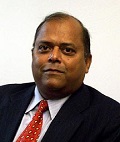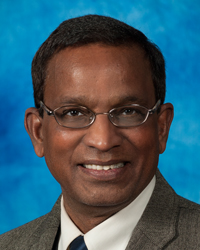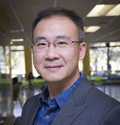2021
9th International Conference on Nano and Materials Science
ICNMS 2021
January 26-29, 2021 | Georgia Institute of Technology, Atlanta, GA, USA
Keynote Speakers
Prof. Ramesh K. Agarwal (Fellow of IEEE, AAAS, AIAA, APS, ASME, CSAA, SME and ASEE)
William Palm Professor of Engineering
Washington University in St. Louis, USA
Professor Ramesh K. Agarwal is the William Palm Professor of Engineering in the department of Mechanical Engineering and Materials Science at Washington University in St. Louis. From 1994 to 2001, he was the Sam Bloomfield Distinguished Professor and Executive Director of the National Institute for Aviation Research at Wichita State University in Kansas. From 1978 to 1994, he was the Program Director and McDonnell Douglas Fellow at McDonnell Douglas Research Laboratories in St. Louis. Dr. Agarwal received Ph.D in Aeronautical Sciences from Stanford University in 1975, M.S. in Aeronautical Engineering from the University of Minnesota in 1969 and B.S. in Mechanical Engineering from Indian Institute of Technology, Kharagpur, India in 1968. Over a period of forty years, Professor Agarwal has worked in various areas of Computational Science and Engineering - Computational Fluid Dynamics (CFD), Computational Materials Science and Manufacturing, Computational Electromagnetics (CEM), Neuro-Computing, Control Theory and Systems, and Multidisciplinary Design and Optimization. He is the author and coauthor of over 500 journal and refereed conference publications. He has given many plenary, keynote and invited lectures at various national and international conferences worldwide in over fifty countries. Professor Agarwal continues to serve on many academic, government, and industrial advisory committees. Dr. Agarwal is a Fellow eighteen societies including the Institute of Electrical and Electronics Engineers (IEEE), American Association for Advancement of Science (AAAS), American Institute of Aeronautics and Astronautics (AIAA), American Physical Society (APS), American Society of Mechanical Engineers (ASME), Royal Aeronautical Society, Chinese Society of Aeronautics and Astronautics (CSAA), Society of Manufacturing Engineers (SME) and American Society for Engineering Education (ASEE). He has received many prestigious honors and national/international awards from various professional societies and organizations for his research contributions.
Prof. Steven Y. Liang (Fellow of ASME, SME, AET)
Morris M. Bryan, Jr. Professor in Mechanical
Engineering
for Advanced Manufacturing Systems
Georgia Institute of Technology, USA
Steven Y. Liang received Ph.D. in Mechanical Engineering from University of California at Berkeley and MS from Michigan State University, USA. Currently Prof. Liang is Morris M. Bryan, Jr. Professor for Advanced Manufacturing at Georgia Institute of Technology. He's Georgia Tech’s founding Director of Precision Machining Research Consortium and Director of Manufacturing Education Program. Dr. Liang is president of Walsin Lihwa Corporation (publicly-traded with $6+ billion revenue), president of North American Manufacturing Research Institution (NAMRI), chair of Manufacturing Engineering Division of American Society of Mechanical Engineers (MED/ASME), Technical Editor of Int’l Journal of Precision Engineering and Manufacturing (Springer) and Editor-in-Chief of Journal of Manufacturing and Materials Processing (MDPI). Dr. Liang's technical interests lie in advanced manufacturing, precision engineering, and materials-centric production. He has supervised over 80 post-doctoral studies, Ph.D. dissertations, and M.S. theses and has published over 700 archival scientific articles and 5 books. He has been invited to deliver more than 70 keynote speeches and seminars in over 20 countries. Dr. Liang served as President of North American Manufacturing Research Institution and Chair of Manufacturing Engineering Division of The American Society of Mechanical Engineers. He is Editor-in-Chief of Journal of Manufacturing and Materials Processing (MDPI) and Editor of International Journal of Precision Engineering and Manufacturing (Springer). Dr. Liang is the recipient of Robert B. Douglas Outstanding Young Manufacturing Engineer Award of SME, Ralph R. Teetor Education Award of SAE, Blackall Machine Tool and Gage Award of ASME, Milton C. Shaw Manufacturing Research Medal of ASME, etc. Dr. Liang is a fellow of ASME, SME, and Academy of Engineering and Technology (AET).
Speech Title: Non-iterative Prediction of
Metal Additive Manufacturing
Abstract: Additive manufacturing (AM) of metals has
promised unparalleled part complexity and small-batch cost effectiveness,
leapfrogging in the state of manufacturing technology. The throughput and
build quality of metal AM has critically hinged upon the capability to
predict and thus optimize the process and final part attributes. To this,
experimental and/or finite element analysis (FEA) studies have been pursued
by many, but they unfortunately suffer from the need of trial-and-error
iterations and the lack of knowledge extendibility. Aiming at a fast and
reliable prediction beyond experimentation and iterative FEM, physics-based
analytical modeling flanked on computational mechanics of materials is
developed at Georgia Tech and presented herein to quantify the
thermodynamics, heat-transfer, and materials thermos-physical behaviors in
powder bed and powder feed metal AM, based upon closed-form solutions
without involving iterations. The temporal and spatial distributions of
temperature, thermal stresses, residual stresses, microstructure, build
distortion, and mechanical properties are expressed as explicit and
algebraic functions of process parameters and powder properties, factoring
in the effects of scan strategy, and powder packing. Bounded-medium
solutions have been established by folding boundary thermal balance
conditions into the traditional semi-infinite medium solutions to compute
material responses near build edges without iterations. Extensive
experimental validations are also presented. The solutions deliver more
penetrating physics of the metal AM process, showing much higher accuracy,
and costing less than 1% computational time of FEM’s, thus promising
effective prediction and optimization for first-and-every-print-correct AM.
Prof. Ramulu Mamidala (Fellow of ASM, ASME, SEM and SME)
Boeing-Pennell Professor of Engineering
University of Washington, USA
Ramulu Mamidala is the Boeing-Pennell
Professor of Engineering at the University of Washington. He has been a
faculty member in Mechanical Engineering since 1982, and adjunct professor
in Industrial & Systems Engineering and Materials Science & Engineering.
Over the past 29 years, Ramulu has been a devoted mentor, educator, and
researcher. He took the leadership role to establish and direct two graduate
educational programs and developed a certificate program in Composite
Materials and Manufacturing that serves working Aerospace Engineers in
collaboration with industry.
Mamidala’s research interests reflect the multi-disciplinary nature of
materials, mechanics and manufacturing engineering, and primarily focuses on
aircraft materials and structures. He has very successful research programs
in fracture mechanics, fatigue and manufacturing engineering. His research
has been supported by NSF, AFOSR, Boeing, GE Super abrasives, Paccar, TRW,
Flow International, Quest, Electro Impact, Kyocera, Pacific Northwest Labs,
McDonald Douglas, and Puget Sound Naval Ship Yard. He is an international
expert on the machining and surface integrity of composite materials and
structures. He received the NSF Presidential Young Investigator Award and
the Technology Award from Waterjet Technology Association. He has supervised
more than 200 graduate students. He has published more than 300 technical
papers in refereed journals and conference proceedings. He has edited five
ASME Symposium Proceedings and co-edited a book, Machining of Ceramics and
Composites. He is one of the founding members of Machining Science and
Technology Journal, and serving as a member of the editorial boards of five
other scientific journals. He is a Fellow of ASM, ASME, SEM and SME.
Mamidala was awarded Outstanding Teacher in the College of Engineering,
1985-86 and was ranked in the top ten professors at the University of
Washington by graduating students in the TYEE yearbook (1986). He was
awarded the ASM-IIM International Lectureship Award (1985-86), the SAE's
Ralph R. Teetor Educational Award (1987), the ASEE's AT&T Foundation Award
for excellence in instruction of Engineering students (1989); and the
Faculty Excellence Award from the UW Minority Science & Engineering Program
(1991). His efforts to foster university-industry collaboration have been
recognized with the “Academic Engineer of the Year” Award (1994) from the
Puget Sound Engineering Council, Washington and “The Ed Wells Summer Faculty
Fellow” from Boeing (1997). For his excellence in online teaching and
innovation, he was awarded the 2004 R1.edu Award and for his contributions
to distance education, he won the 2012 UW Distinguished Contribution to Life
Long Learning Award.
Tutorial Speaker
Prof. Jing Wang
Director of RF MEMS Transducers Group
Center for Wireless and Microwave Information Systems (WAMI Center)
Department of Electrical Engineering, University of South Florida
Dr. Jing Wang is a Full Professor in Department of Electrical Engineering at the University of South Florida, which he joined since 2006. He got dual B.S. degrees in Electrical Engineering and Mechanical Engineering from Tsinghua University in 1999. He received two M.S. degrees, one in electrical engineering, the other in mechanical engineering, and a Ph.D. degree from University of Michigan in 2000, 2002, 2006, respectively. His research interests include micromachined transducers, RF/Bio-MEMS, lab-on-a-chip and microfluidics, functional nanomaterials, nanomanufacturing, and RF/microwave devices. His work has been funded for more than $10M by research grants from federal agencies (NSF, DTRA, US Army, US Air Force, etc.) and contracts from more than a dozen companies. He has published more than 120 peer-reviewed papers and held 10 US patents. He serves as the chairperson for IEEE MTT/AP/EDS Florida West Coast Section and Director for the Wireless and Microwave Information (WAMI) Center. He has been elected as a member of the prestigious IEEE MTT-Technical Coordinating Committee on RF MEMS. He has chaired IEEE Wireless and Microwave Technology Conference (WAMICON) in the last a few years.
Invited Speaker
Prof. Sotirios Grammatikos
Norwegian University of Science and Technology, Norway
S. Grammatikos is a Professor in Polymers and Composites at NTNU in Norway, Director of the ASEM lab and Leader of the Research Group Sustainable Composites. Sotirios is also an Affiliated Professor at Chalmers University of Technology in Sweden. He is specialized in the area of product development, characterization, assessment and structural health monitoring of advanced composite materials and structures. His main research interests are smart features of composites, non-destructive evaluation, recycling and durability. Before joining NTNU, he worked at Chalmers, the University of Bath, UK and the University of Ioannina, Greece. Sotirios holds a PhD in Materials Engineering specialized in Structural Integrity of Aerostructures (2009-2013) and has received training in lightweight aerospace composites from the Hellenic Aerospace Industry (HAI). He is author/co-author of approximately 40 publications with 14 h-index. Currently supervises 20 graduate and post-graduate students, part of 15 research and innovation projects of which 4 he is coordinator.
Speech Title: Challenges of estimating the lifetime of lightweight composites
Abstract: Whilst the design and manufacturing of construction composites has been improved, there are still major issues pertaining to degradation especially in challenging onshore and offshore service conditions. Coupled environmental aging with service-induced degradation lead to significant deterioration during service. Moisture, rain & sand erosion, UV radiation, lightning strikes, impact damage (from bird strikes and hail) as well as thermomechanical fatigue are the major causes of structural degradation. As the effects of the aforementioned conditions (in most cases act in combination) are not always fully understood, unexpected behavior during service often results in structural failures. This undoubtedly reduces the reliability of composites as structural elements making investors and stakeholders reticent in long-term investing in lightweight structures. A complete analysis of the drawbacks of composites that hinder them from being fully adopted by the construction sector will be presented along with the latest technological breakthroughs to overcome such obstacles pertaining to nanotechnology, modelling tools and advanced non-destructive testing.




